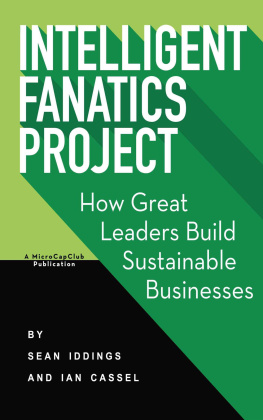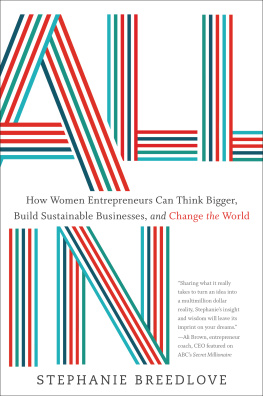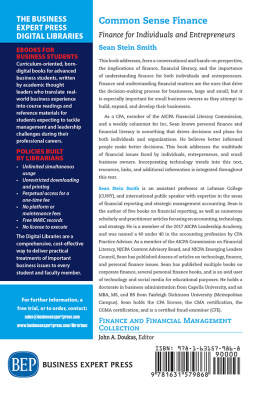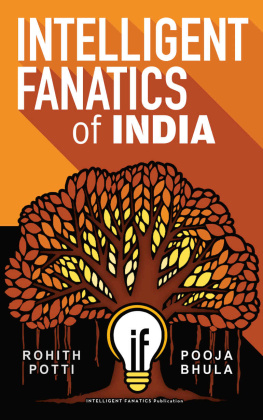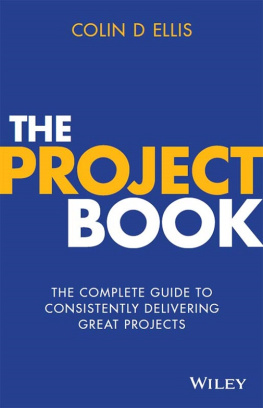Sean Iddings - Intelligent Fanatics Project: How Great Leaders Build Sustainable Businesses
Here you can read online Sean Iddings - Intelligent Fanatics Project: How Great Leaders Build Sustainable Businesses full text of the book (entire story) in english for free. Download pdf and epub, get meaning, cover and reviews about this ebook. year: 2016, publisher: MicroCapClub Publication, genre: Romance novel. Description of the work, (preface) as well as reviews are available. Best literature library LitArk.com created for fans of good reading and offers a wide selection of genres:
Romance novel
Science fiction
Adventure
Detective
Science
History
Home and family
Prose
Art
Politics
Computer
Non-fiction
Religion
Business
Children
Humor
Choose a favorite category and find really read worthwhile books. Enjoy immersion in the world of imagination, feel the emotions of the characters or learn something new for yourself, make an fascinating discovery.
- Book:Intelligent Fanatics Project: How Great Leaders Build Sustainable Businesses
- Author:
- Publisher:MicroCapClub Publication
- Genre:
- Year:2016
- Rating:3 / 5
- Favourites:Add to favourites
- Your mark:
- 60
- 1
- 2
- 3
- 4
- 5
Intelligent Fanatics Project: How Great Leaders Build Sustainable Businesses: summary, description and annotation
We offer to read an annotation, description, summary or preface (depends on what the author of the book "Intelligent Fanatics Project: How Great Leaders Build Sustainable Businesses" wrote himself). If you haven't found the necessary information about the book — write in the comments, we will try to find it.
Sean Iddings: author's other books
Who wrote Intelligent Fanatics Project: How Great Leaders Build Sustainable Businesses? Find out the surname, the name of the author of the book and a list of all author's works by series.
Intelligent Fanatics Project: How Great Leaders Build Sustainable Businesses — read online for free the complete book (whole text) full work
Below is the text of the book, divided by pages. System saving the place of the last page read, allows you to conveniently read the book "Intelligent Fanatics Project: How Great Leaders Build Sustainable Businesses" online for free, without having to search again every time where you left off. Put a bookmark, and you can go to the page where you finished reading at any time.
Font size:
Interval:
Bookmark:
Intelligent Fanatics Project:
How Great Leaders Build Sustainable Businesses
Sean Iddings and Ian Cassel
Copyright 2016 by Sean Iddings and Ian Cassel
All Rights reserved.
Published in the United States by:
Intelligent Fanatics LLC
35 Bank Street
Newfield, NY 14867
www.IntelligentFanatics.com
Cover Design: Carl Moebis
in*tel*li*gent fa*na*tic /in tel j nt f nadik/ - n (orig. from Charlie Munger)
Founder, CEO or management team with unconventional ideas and a fanatical drive to build a high-performance organization. A learning machine that can quickly adapt to change. Able to create a trust based culture that aligns everyone to think like owners. Focused on acquiring, training, and motivating the best talent. Their time horizon is in ten-year increments, not quarterly, and they invest in their businesses accordingly. Regardless of the industry, they are able to create an impenetrable moat that competitors initially cannot understand and eventually fear.
Preface
Im a full-time private microcap investor and founder of MicroCapClub. Microcaps are small public companies with market capitalizations of less than $300 million. You can buy a microcap company on the stock exchange just as you can buy larger companies such as General Electric, Home Depot, Ford, and Pfizer. There are more than 28,000 of these microcap companies on worldwide exchanges, and they make up roughly half of all public companies. Microcap companies offer investment opportunity because they are small, unknown, and generally ignored by many investors.
The best-performing stocks ever, including Berkshire Hathaway, Apple, Walmart, Amgen, Netflix, Southwest Airlines, and many others, started as small microcap companies. The key to outsized returns is finding great companies early, because all great companies started as small companies. I make my living by sifting through the thousands of microcap companies that exist, trying to find and invest in the next great opportunity.
A big part of my investing process is finding and betting on the right founder or CEO. I want to find a founder who has the ability to grow a small business into a large one. These founders are rare, and they are what Charlie Munger first referred to as intelligent fanatics. Its great to read about intelligent fanatics like Elon Musk, Larry Ellison, Howard Schultz, and others after theyve made other investors billions, but I want to find them early in their careers. I want to find Reed Hastings in 2002, when Netflix (NFLX) was a $150 million market cap microcap (now worth $38 billion). I want to find Bruce Cozadd in 2009, when Jazz Pharmaceuticals (JAZZ) was a $50 million market cap microcap (now worth $9 billion).
All great companies started as small companies, and intelligent fanatics founded most great companies. So how do we find these rare intelligent fanatics early? We find them by studying known intelligent fanatics and their businesses. We look for common elements and themes, to help us in our search for the next intelligent fanaticled business.
There are hundreds of intelligent fanatic stories and businesses to learn from, so Im excited to partner with Sean Iddings on the Intelligent Fanatics Project. Whether you are an investor like me, a business owner, an aspiring entrepreneur, or just mildly interested in business, this book is for you.
Ian Cassel
Introduction
Its quite interesting to think about Walmart starting from a single store in Bentonville, Arkansas, against Sears, Roebuck with its name, reputation, and all of its billions. How does a guy in Bentonville, Arkansas, with no money blow right by Sears, Roebuck? And he does it in his own lifetimein fact, during his own late lifetime, because he was already pretty old by the time he started out with one little store...
He played the chain store game harder and better than anyone else. Walton invented practically nothing. But he copied everything anybody else ever did that was smartand he did it with more fanaticism and better employee manipulation. So he just blew right by them all.
He also had a very interesting competitive strategy in the early days. He was like a prizefighter who wanted a great record so he could be in the finals and make a big TV hit. So what did he do? He went out and fought 42 palookas. Right? And the result was knockout, knockout, knockout42 times.
Walton, being as shrewd as he was, basically broke other small-town merchants in the early days. With his more efficient system, he might not have been able to tackle some titan head-on at the time. But with his better system, he could destroy those small-town merchants. And he went around doing it time after time after time. Then, as he got bigger, he started destroying the big boys.
Charlie Munger, Poor Charlies Almanack
In the United States, small businesses employ 50% of the workforce, and small businesses accounted for 64% of net new jobs added over the past ten years. When you see an entrepreneur, thank him or her. The odds are stacked against them, yet they push forward anyway. First-time entrepreneurs have a success rate of 18%. A failed first-time entrepreneur has a 20% chance of success with his or her next start-up. Even venture capitalbacked entrepreneurs who had successful initial public offerings only have a 30% chance of success with their next start-up. In addition, the National Federation of Independent Business evaluated the latest U.S. census and survey data and concluded that only 39% of all small businesses make a profit over their lifetime. Thankfully, the entrepreneurial spirit is alive and well, most often manifested by a person finding a solution to a problem and saying, It might as well be me.
***
When some idea is shaking you so hard, youre willing to go into poverty to make it a reality, thats when you become an entrepreneur.
Reed Hastings, founder of Netflix
Its hard to refute these statistics. Entrepreneurial success is rare. Even more uncommon are founders who start and grow a business that, over time, dominates its niche, geographic region, or industry. How did Walmart succeed? If you had the ability to invest in Walmart in the 1960s, when it had only a few stores, you werent betting on Walmart, you were betting on Sam Walton. Perhaps most impressive was how Waltons leadership transcended Walmart. He led the company just as effectively when it had a thousand stores as he did when it had only one. His influence permeated the culture so effectively that Walmart would succeed long after his passing, in 1992. Sam Walton was an intelligent fanatic.
Charlie Munger first coined the term intelligent fanatic, which remained dormant until professor and fund manager Sanjay Bakshi wrote an article entitled Seven Intelligent Fanatics from India. In the article, Bakshi wrote about seven intelligent fanatic founders who built large, quality businesses in India. He highlighted three essential ingredients: integrity, energy, and intelligence. We have expanded upon these ingredients and believe the following formula embodies an intelligent fanatic:
Intelligent fanatic = (Long-term vision + Intelligence + Energy + Perseverance + Execution) x Integrity
Most everyone has heard of intelligent fanatics like Sam Walton, Jeff Bezos, Bill Gates, and others, but there are hundreds of others with incredible stories of failure, triumph, and perseverance. Many of them have studied or have interviewed great businesspeople on their way to success. For example, Elon Musks and Bill Gatess recommended reading lists are full of biographies and autobiographies of successful inventors, innovators, and entrepreneurs.
In this book, we highlight eight intelligent fanatics:
- John H. Patterson National Cash Register
- Simon Marks Marks & Spencer
- Sol Price FedMart & Price Club
Font size:
Interval:
Bookmark:
Similar books «Intelligent Fanatics Project: How Great Leaders Build Sustainable Businesses»
Look at similar books to Intelligent Fanatics Project: How Great Leaders Build Sustainable Businesses. We have selected literature similar in name and meaning in the hope of providing readers with more options to find new, interesting, not yet read works.
Discussion, reviews of the book Intelligent Fanatics Project: How Great Leaders Build Sustainable Businesses and just readers' own opinions. Leave your comments, write what you think about the work, its meaning or the main characters. Specify what exactly you liked and what you didn't like, and why you think so.

